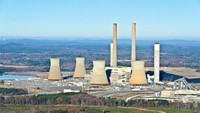Advertisement
Grab your lab coat. Let's get started
Welcome!
Welcome!
Create an account below to get 6 C&EN articles per month, receive newsletters and more - all free.
It seems this is your first time logging in online. Please enter the following information to continue.
As an ACS member you automatically get access to this site. All we need is few more details to create your reading experience.
Not you? Sign in with a different account.
Not you? Sign in with a different account.
ERROR 1
ERROR 1
ERROR 2
ERROR 2
ERROR 2
ERROR 2
ERROR 2
Password and Confirm password must match.
If you have an ACS member number, please enter it here so we can link this account to your membership. (optional)
ERROR 2
ACS values your privacy. By submitting your information, you are gaining access to C&EN and subscribing to our weekly newsletter. We use the information you provide to make your reading experience better, and we will never sell your data to third party members.
Environment
Serious On Global Warming
by Rudy Baum
April 27, 2009
| A version of this story appeared in
Volume 87, Issue 17
THE ENVIRONMENTAL Protection Agency's recent proposed finding that carbon dioxide and five other greenhouse gases "threaten the public health and welfare of current and future generations"—an "endangerment finding"—is a watershed event in the long struggle to combat global climate change (see page 5).
The proposed endangerment finding states, "In both magnitude and probability, climate change is an enormous problem. The greenhouse gases that are responsible for it endanger public health and welfare within the meaning of the Clean Air Act." In addition to CO2, the finding targets methane, nitrous oxide, hydrofluorocarbons, perfluorocarbons, and sulfur hexafluoride.
As a press release from EPA noted, "Today's proposed finding does not include any proposed regulations. Before taking any steps to reduce greenhouse gases under the Clean Air Act, EPA would conduct an appropriate process and consider stakeholder input. Notwithstanding this required regulatory process, both President Obama and Administrator [Lisa P.] Jackson have repeatedly indicated their preference for comprehensive legislation to address this issue and create the framework for a clean energy economy."
Make no mistake, however, the U.S. is now irrevocably committed to controlling its production and emission of greenhouse gases. While President Obama prefers a legislative approach, he now has the clear authority and obligation to regulate greenhouse gases in the absence of legislation.
Only a couple of weeks prior to EPA's proposed finding, House Energy & Commerce Committee Chairman Henry A. Waxman (D-Calif.) and Energy & Environment Subcommittee Chairman Edward J. Markey (D-Mass.) released their draft climate-change bill (C&EN, April 6, page 6). The sweeping 648-page draft contains subsections, or "titles," on clean energy, energy efficiency, reducing global-warming pollution, and transition to a clean energy economy. The global-warming title places limits on emissions of heat-trapping pollutants that will reduce greenhouse gas emissions by 83% below 2005 levels by 2050.
A key issue not addressed in the draft is how to allocate the tradable emission allowances that restrict the amount of global-warming pollution emitted by electric utilities, oil companies, and other sources; that issue will be addressed by the committee as it takes up the legislation.
The Obama Administration wants those allowances to be auctioned off, and had planned to use the proceeds of the auctions to help finance R&D on alternative energy. Already, utilities and other greenhouse gas emitters are lobbying to have them distributed free, arguing, as always, that they just cannot afford to pay to pollute.
This "cap-and-trade" system proposed by Waxman and Markey, especially if the allowances are auctioned rather than distributed free, is a step in the right direction. I would prefer a straightforward "carbon tax" that applies to all fossil fuels as a more effective and more honest way to control greenhouse gas emissions.
What no one wants to admit is that this is not going to be painless. The summary of the Waxman-Markey draft legislation states, "The legislation will create millions of new clean energy jobs, save consumers hundreds of billions of dollars in energy costs, enhance America's energy independence, and cut global warming."
The legislation might do three out of four of those things, but if it does those three, it's not going to save hundreds of billions of dollars in energy costs. Fossil fuels are cheap because we do not mandate that the cost of disposing of the waste that results from burning them—CO2—is incorporated into the price charged for them.
It's not complicated. To prevent the worst-case projections of global climate change, the cost of fossil fuels must increase substantially so that people will find it uneconomical to burn them so profligately and alternatives become attractive. Accomplish this through cap-and-trade or through a carbon tax, but stop pretending that it can be done on the cheap. Alternative energy sources will remain more expensive than fossil fuels so long as the atmosphere can be treated as a no-cost CO2 sewer. That has to change or nothing else will.
Thanks for reading.
Views expressed on this page are those of the author and not necessarily those of ACS.



Join the conversation
Contact the reporter
Submit a Letter to the Editor for publication
Engage with us on Twitter